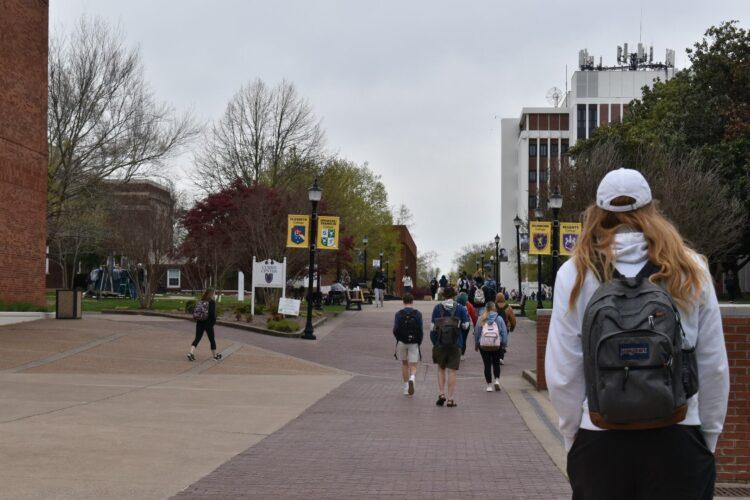Jill Smith
Staff Writer
jsmith194@murraystate.edu
The University lifted its mask mandate in February after the Centers for Disease Control and Prevention reported a “medium” community level for COVID-19. As of today, the CDC reports Calloway County as a “low” community level. With this guidance, campus operations are returning to normal.
Only three Kentucky counties are now in the “medium” level of COVID-19 cases: Floyd, Johnson and Magoffin, according to the Kentucky COVID-19 website.
Murray State President Bob Jackson said the University will continue to monitor the CDC’s guidance as well as other state and local healthcare guidance in relation to COVID-19.
“As noted in previous emails, the CDC is now using a COVID-19 Community Level tool (county tracker) to provide guidance regarding COVID-19 safety measures, which we are following,” Jackson said via email. “The current COVID-19 community level for Calloway County is at the ‘low’ level, per the CDC Community Level tool.”
If the county were to return to the “high” level per the CDC Community Level tool, the University mask mandate would be reinstated.
Junior engineering and physics major Hayden Smee said he was shocked when the mask mandate was lifted.
“After nearly two years of wearing the mask, it started to feel like we would never go back to when they weren’t needed,” Smee said. “We weren’t given a heads up before the mandate was dropped, not that I necessarily expected one. I could tell a change was coming based on local and statewide case numbers.”
Smee said by saying campus is returning to “normal,” it oversimplifies the transition.
“‘What is normal?’ has been asked numerous times throughout the pandemic in relation to pre-COVID life, but we have to consider what we’re calling ‘normal,’” Smee said. “We’re simply seeing the beginning of recovery in the form of taking off our masks and holding events indoors and bringing back campus traditions that half our students have never even heard of.”
Smee said the University is in a complicated position where not only can administrators readopt pre-COVID-19 procedures, but also implement different plans to bolster University campus life.
COVID-19 not only impacted relationships between students and faculty members, but it also impacted teaching and learning styles.
“As far as learning goes, it just felt like the online—Zoom and asynchronous—courses forced upon me were a challenge,” Smee said. “In-person classes were a challenge too. Spreading 20 students out in a lecture hall made for 100 also prevented a proper student-faculty relationship, as well as relationships with other students.”
Smee said he saw his grades decline during the months heavily impacted by COVID-19.
With the added stress from the pandemic, Jackson has emphasized the Counseling Center’s availability to students, faculty and staff.
“The Psychological Center also provides in-person counseling sessions for students, faculty and staff, as well as walk-in crisis sessions,” Jackson said. “Please call 270-809-2504 to schedule an appointment. Faculty and staff are also provided counseling services through the University’s Employee Assistance Program at 800-441-1327 or Wayne Corp. This is a voluntary confidential program available at no cost.”
To schedule an appointment with the Counseling Center, email msu.counselingcenter@murraystate.edu.
Jackson said COVID-19 policies for the fall semester are still being developed in consultation with the CDC and state and local healthcare providers.
Jackson encourages those who are not vaccinated to consult with their healthcare providers about getting the COVID-19 vaccine.
“We have been pleased with the availability of weekly vaccines, booster vaccines and testing opportunities held in the Curris Center by Kentucky Care, as well as through MSU Health Services on campus and in other locations by outside providers throughout our region,” Jackson said. “We encourage everyone to visit the Racer Restart page for additional information, including vaccine and booster vaccine opportunities and other testing locations.”
The next and final vaccine clinic will be Tuesday, April 26, on the first floor of the Curris Center from 10 a.m to 2 p.m.



























































































